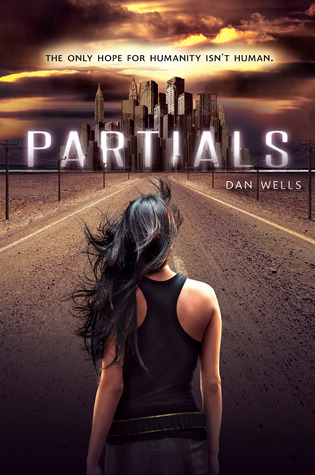The human race is all but extinct after a war with Partials—engineered organic beings identical to humans—has decimated the population. Reduced to only tens of thousands by RM, a weaponized virus to which only a fraction of humanity is immune, the survivors in North America have huddled together on Long Island while the Partials have mysteriously retreated. The threat of the Partials is still imminent, but, worse, no baby has been born immune to RM in more than a decade. Our time is running out.
Kira, a sixteen-year-old medic-in-training, is on the front lines of this battle, seeing RM ravage the community while mandatory pregnancy laws have pushed what’s left of humanity to the brink of civil war, and she’s not content to stand by and watch. But as she makes a desperate decision to save the last of her race, she will find that the survival of humans and Partials alike rests in her attempts to uncover the connections between them—connections that humanity has forgotten, or perhaps never even knew were there.
Dan Wells, acclaimed author of I Am Not a Serial Killer, takes readers on a pulsepounding journey into a world where the very concept of what it means to be human is in question—one where our humanity is both our greatest liability and our only hope for survival.
This is not a book. I repeat, this is not a book.
This is an epic. This is an emotional journey. This is a masterpiece so gripping, so riveting, so intense that tying it down to one word, “book”, may actually be offensive. This is Partials, and it’s the best dang novel I’ve read since sobbing like a child became cooler than toaster ovens.
Kira Walker is, above all, an idealist. Beyond this, she is many things: a medic-in-training, a mad scientist, a subject of first love, a teenage girl driven by the absurd notion that she can save the world. A notion that is, of course, not unfamiliar to the majority of our teenage population. A notion that is, in Kira’s world, a hope so fiercely hoped that it is hardly uttered out loud.
Bring in Marcus, Kira’s trusty boyfriend who just happens to be loving and supportive. Oh, and if you weren’t swooning before, he’s also unbelievably (and slightly sarcastically) hilarious. Yep, attractive.
“Look on the bright side,” said Marcus.
Kira waited.
“This is the point,” she said, “at which you would traditionally suggest a bright side.”
“I’ve never been a real traditional guy,” said Marcus. “Besides, I’m not saying I know a bright side, I just think this would be a great time to look at one.”
Jayden raised his fist, and the group stopped walking.
“Jayden just hear a bright side,” whispered Marcus. “There’s an uplifting metaphor creeping through those bushes.”
However, this is not a chipper story; this is not a tale of a happily-ever-after shared by two very fortunate teenagers. No, this is a story of aftermath, and of the number of ways that a society can fall apart, and of what happens when they all do.
A company specialized in the manhandling of genetics, named ParaGen, created the Partials: biological machines that seem exactly like humans, but are stronger, faster, better-looking, sporting built-in weaponry. These killing machines were once loyal to the US; they fought for their country during the Isolation War, and having won it, were assigned mundane jobs for the good of the community. However, sometime later they rebelled against their government, leading the world into turmoil and leaving dozens of humans dead, and finally releasing the RM virus to finish the job– a virus that killed more than 99% of the world’s population.
Partials takes place 11 years after that fatal day. The small fraction of mankind that is immune to RM has taken refuge on Long Island, but it is hardly the unified nation portrayed in the image to which it desperately clings. Amongst other things going wrong, rebels surround Kira’s community, tension grows inside of it, and attempts to find a cure to RM become more frantic. They become so frantic, in fact, that the government—because what would this novel be without a corrupt government?— has begun to breed the remaining humans like cattle in the fervent hope that a child is born immune.
“Forget love, forget freedom, forget choice, just get knocked up and save the damn world already. ”
~Kira paraphrasing the Hope Act
Oh, and did I not mention that the youngest known human being on the planet is 14 years old? Oops. Humanity’s fast-approaching expiration date must have slipped my mind.
Wow; all of this talk and we haven’t even gotten to my favourite part of Partials yet: the medical commentary. Kira, besides being a total kick-crack heroine, is one smart cookie: she’s in training to become a medic in the maternity ward. You might think that the maternity ward is somewhat, if only slightly, boring—and you might be right. However, you need not fear: when Kira takes the search to find a cure to RM into her own hands, Partials waves all of those pregnant mothers goodbye and slam-dunks its readers into private laboratories, dumbed-down medical jargon , and medical phenomena explained.
If you are at all familiar with my reading preferences, you’ll know that a novel integrating a plague (taking post-apocalyptic plots to the next level since the 14th century), great medical elements (sci-fi like you’ve never seen it before), and a wildly corrupt and selfish government (also known as the best part of a dystopian!) is not only right up my alley, but the best book I’ve read all summer. Partials is the book for you if you liked Cinder’s Human-Like Cyborg V.S. Unfeeling Monster battle, if you liked Contagion’s dip into the medical domain, or if you appreciate good plots, great characters, and a helluva of a lot of action. 5/5 stars!
I’ll keep you posted,



![[Twitter]](http://www.whatyareading.com/wp-content/plugins/bookmarkify/twitter.png)
